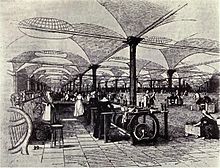

Flax mills are mills which process flax. The earliest mills were developed for spinning yarn for the linen industry.
John Kendrew (an optician) and Thomas Porthouse (a clockmaker), both of Darlington developed the process from Richard Arkwright's water frame, and patented it in 1787. The first machine was set up in Low Mill on the River Skerne at Darlington, which Kendrew used to grind glass. They then each set up a mill of their own, Kendrew near Haughton-le-Skerne and Porthouse near Coatham Mundeville, both on the same river.[1]
They also granted permits, enabling others to build similar mills, including in northeast Scotland, where early mills included those in Douglastown, Bervie and Dundee.[2] Others were built in Leeds. Matthew Murray moved from Darlington to set up a mill at Adel near Leeds, where he built an improved spinning machine for John Marshall. In 1791, Marshall built another mill in Holbeck near Leeds. Murray later became a noted textile engineer as a partner in Fenton, Murray and Wood.[3]
Ditherington Flax Mill in Shrewsbury, built in 1797, is the world's first iron-framed building, and hence a forerunner of all skyscrapers.[4]
In 1805, Malleny Mill was built on the eastern edge of Balerno to process Flax.[5]
- ^ A. J. Wardey, The linen trade: ancient and modern (1864; repr. 1967), 690–92
- ^ Wardey, 692 and passim.
- ^ W. English, The Textile Industry (Longmans, London 1969), 158–60.
- ^ A. W. Skempton and H. R. Johnson, 'The First Iron Frames' Architectural Review (March 1962); repr. in R. J. M. Sutherland, Structural Iron 1750–1850 (Ashgate, Aldershot 1997), 25–36.
- ^ Historic Environment Scotland. "44 HARLAW ROAD, THE GLEN, MALLENY MILL WITH MILL LADE AND BOUNDARY WALL (LB26907)". Canmore. Retrieved 18 June 2022.